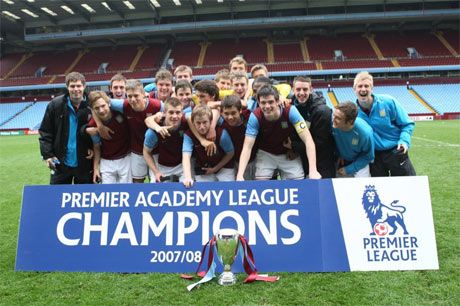The prospect of playing for a Premier League academy is, for many children, the stuff of dreams but it’s an arduous journey to get there. The select youngsters that really stand out when playing for their local team may get scouted and offered a highly competitive trial but, for those who show potential and do join, passage through such a cut-throat environment is tougher still. Life as a football scholar is unforgiving at the best of times and many teenagers drop out, so are academies doing enough for the players that don’t make the grade?
Research by the Professional Footballers’ Association has shown that, of the players that get offered academy scholarships at the age of sixteen, only around 40% go on to earn professional contracts at their club. While this seems like a reasonable figure (after all, not every young footballer goes on to fulfil their initial potential) further investigation by the PFA has presented more worrying findings: only 20% of that initial batch of scholars are still playing professionally by the time they reach the age of twenty-one.
This is an alarming discovery. With the abject failure of the England team at the recent European Under-21 Championships, the issues surrounding youth football and the production of home-grown talent have become more prominent than ever before. In addition, findings by Sport England have discovered that participation in football has fallen by 11.76% over the last year. The results of their survey, in which they interviewed people over the age of sixteen, reflect the troubling current state of the sport.
With so many dropping out or giving up on the game, it is important to consider the role of professional academies. Most punters are only concerned with the talent coming through, but one must also consider the players that don’t make the cut, as far too often they become an afterthought the moment they are released. The majority of teenage prospects will experience rejection at some stage of their footballing education, so what are academies doing to prepare their scholars for it?
A considerable number of academies now combine football tutelage with more mainstream forms of teaching but, at present, the balance is not quite right. Although, first and foremost, they are obviously institutions designed to produce footballers, the paltry one day per week that many offer for ‘education days’ is simply not good enough. There needs to be a greater focus on vocational education and preparing scholars for a life outside of playing football, considering that many concentrate so much on making it to the top of the professional game that they have nothing to fall back on if they fail.
Sam Allardyce made a fantastic recent suggestion, putting forward the idea that academy rejects should be entered into refereeing schools. This would help address the problem of a lack of playing experience in officials, which is often criticised, and help bring through better quality, more knowledgeable referees. Another potential route for former scholars could also be coaching. With the FA keen to bring more English managers through, players should be made aware of coaching options and qualifications earlier in their careers. It has become the norm in this country for footballers in their thirties to start accumulating the appropriate coaching badges, but managers like José Mourinho and André Villas-Boas have made it to the top without any playing experience. This is something academies should certainly help to rectify.
More standard options that many scholars end up pursuing include degrees or college courses in physiotherapy, sports science, sports marketing or sports psychology. Routes that allow drop-outs to remain in professional sport in a non-playing role are extremely popular so academies should look to do more to promote similar, less popular alternatives. Ultimately, they need to take more responsibility and provide a better all-round service for their scholars, because it’s not just those lacking in quality that can drop out; injury is also an important factor to consider.
It can affect anyone, especially players who specialise in a particular sport and train from a very young age. Dr Neeru Jayanthi, a medical director specialising in sports injuries, has published research indicating that severe overuse injuries in young athletes are directly linked with intense, specific training. Based on his findings, he makes several recommendations about limiting the amount of specialised training at a young age, which academy methodology contravenes. In addition, there is always the risk of obtaining a freak injury. Sean Highdale played at various youth levels for Liverpool and England before being involved in a car crash in 2008. Although he recently won a substantial legal case, he has still been robbed of a career and no amount of money can make up for that; what he really needs now are alternative options to earn a living.
And this is what academies need to focus their attention on. If they can produce the next Bale, Walcott or Wilshire, that’s obviously great, but they need to focus more on the aforementioned 80% of scholars that don’t end up with professional careers. They need to rid themselves of the selfish, obsessive mind-set that is currently dominating football and, instead, look to cater more for those that don’t quite make the grade. Considering that they encourage youngsters to devote so much time and effort towards football, academies must stand up and take responsibility for their futures, whether they succeed in the sport or not.
|
Dan Yeo
|










Recent Comments